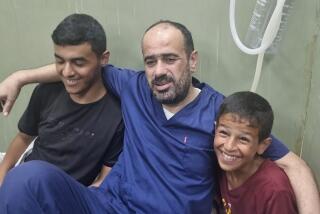Newly freed Israeli soldier finds himself in spotlight
Reporting from Jerusalem — Israeli soldier Gilad Shalit was a shy, gangly teenager from a remote northern town when militants dragged him over the border to the Gaza Strip five years ago. He has returned as a national icon and one of the country’s most recognized faces.
Awaking to his first full day of freedom Wednesday, Shalit began the long road to recovery from untreated shrapnel wounds, malnutrition, mental trauma and sunlight deficiency disorders caused by being kept in an isolated indoor cell.
But the 25-year-old will also have to confront a sudden, new celebrity status at home that will probably follow him for the rest of his life.
Pictures of the lanky soldier, freed Tuesday as part of an Israeli-Palestinian prisoner swap involving the staggered release of 1,027 Palestinian prisoners, are everywhere.
While he was held captive, Shalit’s image was plastered on bumper stickers, T-shirts and billboards, including in Los Angeles and New York City. Life-size cardboard cutouts of the soldier were placed at protests and outside the prime minister’s residence to serve as constant reminders.
Now supporters who held cross-country marches to keep his plight in the news and put up a protest tent in Jerusalem are struggling with how to give Shalit space and privacy, two things that Israel’s close-knit culture of informality and camaraderie doesn’t always provide.
“He needs quiet and a gradual return to normalcy,” said Gabriel Weimann, a University of Haifa expert in public opinion and media psychology. “I think that’s what he will get. Israel has a history of dealing with prisoners of war, and he’s surrounded by family and experts who will make sure that happens.”
Before Shalit’s release, media outlets debated how to handle the story without harassing the family or invading its privacy. The government helped negotiate a voluntary 10-day cooling-off period during which photographers and reporters are supposed to steer clear.
But as Israel’s police tried to declare the Shalit family home in Mitzpe Hila off-limits, hundreds of well-wishers and journalists swarmed the place. When Shalit took a walk Wednesday morning with his family, photographers were there to catch every step.
“For 5 1/2 years no one embraced you,” wrote Maariv newspaper columnist Ben Caspit on Wednesday. “Now you may be smothered with embraces.”
Even Prime Minister Benjamin Netanyahu has taken heat in the Israeli media for appearing to use Shalit’s release as a photo op. On Tuesday, the prime minister personally welcomed the soldier as he disembarked from an Israeli helicopter. When Shalit was reunited with his father for the first time, Netanyahu was criticized for standing in the photo frame.
Egyptian TV also came under fire for the interview it conducted with Shalit before he was turned over to Israeli authorities, while his captors from the Palestinian militant group Hamas stood nearby. Shalit complained about feeling unwell and seemed to be uncomfortable and struggling for breath, yet the interviewer continued asking questions.
The fact that many Israelis consider Shalit to be a part of their own family was crucial when his parents were struggling to keep their son’s captivity in the spotlight. Interest from the media was welcomed.
Now, however, the perceived intimacy with Shalit feels differently as strangers approach him on the street to offer him a hug or photographers climb ladders to get a better view of his house.
“He doesn’t need people walking up to him and slapping him on the back, and certainly not for his house to become a pilgrimage site or a stop on people’s weekend hikes,” said Uri Ehrenfeld, a former Israeli soldier who was captured and tortured by Egypt during the 1973 Yom Kippur War. “This isn’t healthy and it doesn’t help.”
During a media briefing Tuesday night, Shalit’s father said his son was not ready to face the glare of the spotlight and asked Israelis to respect the family’s privacy.
“It’s difficult for him to be exposed to many people after being in isolation for such a long time,” Noam Shalit said.
Military officials are providing security for Shalit for a period of time.
Weimann said the public’s interest in Shalit, which is likely to continue as he starts a family and career, could weigh heavily on the young man.
Many Israelis have criticized the high price Israel paid to obtain Shalit’s release because the Palestinian prisoners being released include many who admitted to killing Israelis and vowed to try again. Shalit may feel a sense of personal responsibility to live up to expectations, Weimann said.
“This is quite a heavy job for someone who is just a young soldier,” Weimann said. “I’m not sure he’s prepared to satisfy some of the demands of his new status.”
Batsheva Sobelman in The Times’ Jerusalem bureau contributed to this report.
More to Read
Sign up for Essential California
The most important California stories and recommendations in your inbox every morning.
You may occasionally receive promotional content from the Los Angeles Times.










